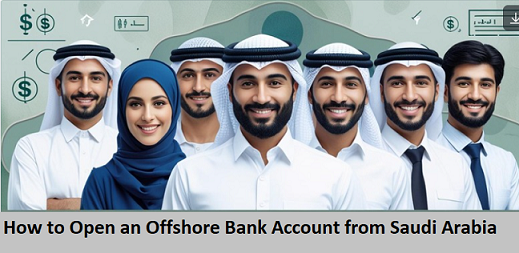How to Open an Offshore Bank Account from Saudi Arabia
Introduction
In today’s interconnected financial world, many individuals and businesses in Saudi Arabia are looking beyond domestic banks to explore international opportunities. One of the most effective ways to do this is by opening an offshore bank account. Whether for diversification, investment, asset protection, or global business operations, offshore banking offers a unique set of benefits.
This comprehensive 2025 guide will walk you through everything you need to know about opening an offshore bank account from Saudi Arabia from understanding the benefits and legal considerations to selecting the right jurisdiction and bank. We’ll also share real-life testimonials, practical tips, and common mistakes to avoid, ensuring you have a smooth and compliant experience.
Why Offshore Banking Appeals to Saudi Residents
Offshore banking is not just for billionaires or multinational corporations — it’s a practical tool for anyone with legitimate financial goals.
1. Diversification of Assets
Keeping all your savings in one country exposes you to political, economic, or currency fluctuations. Offshore accounts allow you to hold multiple currencies, reducing risk.
2. Access to International Investments
Some investments, such as foreign real estate or global stock markets, require an offshore account for easier transactions.
3. Privacy and Confidentiality
While Saudi Arabia offers strong banking privacy laws, certain offshore jurisdictions provide additional confidentiality layers.
4. Currency Flexibility
You can hold USD, EUR, GBP, and other major currencies without conversion restrictions.
5. Business Opportunities
For Saudi entrepreneurs and freelancers, offshore accounts make it easier to receive payments from clients abroad.
Is Offshore Banking Legal in Saudi Arabia?
Yes — offshore banking is legal for Saudi residents, provided the funds are obtained legally and you comply with the Saudi Arabian Monetary Authority (SAMA) regulations.
However, it is important to:
-
Declare taxable income from foreign investments if applicable.
-
Comply with Anti-Money Laundering (AML) laws in both Saudi Arabia and the offshore jurisdiction.
-
Avoid banks that are blacklisted or not recognized by global financial authorities.
Tip: Consult a financial advisor familiar with Saudi banking regulations before making any offshore transactions.
Best Offshore Banking Jurisdictions for Saudi Residents (2025)
Not all offshore jurisdictions are created equal. Here are some of the most popular and reputable options for Saudi account holders:
| Jurisdiction | Why It’s Popular | Minimum Deposit | Best For |
|---|---|---|---|
| Switzerland | Strong privacy laws, stable economy | $50,000+ | High-net-worth individuals |
| Singapore | Robust financial system, strict AML compliance | $10,000+ | Business owners |
| UAE (Dubai) | Proximity to KSA, Arabic-speaking, tax-friendly | $5,000+ | Personal and corporate accounts |
| Cayman Islands | No direct taxes, popular for investments | $20,000+ | Investors |
| Mauritius | Strategic African gateway, English-speaking | $5,000+ | SMEs and entrepreneurs |
Step-by-Step Guide: How to Open an Offshore Bank Account from Saudi Arabia
Step 1: Define Your Purpose
-
Are you looking for investment diversification?
-
Do you need a multi-currency business account?
-
Are you aiming for wealth preservation?
Your purpose will determine the best jurisdiction and account type.
Step 2: Choose the Right Jurisdiction
Consider:
-
Reputation & Stability of the country
-
Banking fees and interest rates
-
Ease of account opening for non-residents
-
Double taxation agreements with Saudi Arabia
Step 3: Select a Bank
Look for:
-
Strong international presence
-
Online banking availability
-
English/Arabic support
-
Reasonable fees
Example:
Many Saudi residents prefer Emirates NBD in Dubai for its Arabic-speaking staff, proximity, and familiarity with Gulf clients. How to Open an Offshore Bank Account from Saudi Arabia
Step 4: Gather Required Documents
Most banks require:
-
Valid passport
-
Saudi residence permit (Iqama) or proof of address
-
Proof of income or business activity
-
Bank statements from your Saudi bank
-
Letter of reference from your current bank
Step 5: Apply
-
Some banks allow online pre-application forms.
-
Others require in-person visits (common in Switzerland, Singapore).
-
Expect identity verification and possibly a video call interview.
Step 6: Fund Your Account
-
Most banks have a minimum deposit requirement.
-
Funds must come from legitimate, traceable sources.
Step 7: Start Using Your Account
-
Activate online banking access.
-
Order debit/credit cards if available.
-
Begin international transfers or investments.
Understanding Offshore Banking Fees
-
Account Maintenance Fees: Monthly or yearly charges.
-
Transaction Fees: For incoming/outgoing transfers.
-
Currency Conversion Fees: If you switch between currencies.
-
ATM Withdrawal Fees: For cash withdrawals abroad.
How to Open an Offshore Bank Account from Saudi Arabia
Common Mistakes to Avoid
-
Not researching the bank’s reputation
-
Ignoring tax obligations
-
Falling for scams from unlicensed banks
-
Choosing a jurisdiction purely for secrecy
-
Not keeping proper transaction records
Real Saudi Trader & Business Owner Testimonials
Khalid A., Jeddah — Investor:
“Opening an account in Singapore gave me easy access to Asian markets. The process took 3 weeks, and the bank was very professional.”
Fatimah R., Riyadh — E-commerce Entrepreneur:
“My Dubai offshore account helps me receive payments from European clients without currency conversion issues.”
Mohammed S., Dammam — Oil Industry Consultant:
“Switzerland remains my top choice. I value the security and stability it offers.”
FAQs on Offshore Banking in Saudi Arabia (2025)
Q1: Can I open an offshore account without leaving Saudi Arabia?
Yes, some banks offer remote account opening through certified notaries and online verification.
Q2: How much money do I need to open an offshore account?
It varies — from $5,000 in Dubai to $50,000+ in Switzerland.
Q3: Are offshore accounts safe?
If you choose regulated and reputable banks, they are generally very secure.
Q4: Will my offshore income be taxed in Saudi Arabia?
Saudi Arabia does not have personal income tax, but foreign countries may have tax obligations.
Q5: Can I hold multiple currencies?
Yes, most offshore accounts are multi-currency.
Final Thoughts on Opening an Offshore Account from Saudi Arabia
Opening an offshore bank account in 2025 is a smart move for Saudi residents seeking financial diversification, global access, and currency flexibility. The key is choosing the right jurisdiction, ensuring compliance with Saudi and international laws, and maintaining transparent financial practices.
With proper planning, offshore banking can open new doors for investment, business growth, and wealth protection making it a powerful tool for forward-thinking individuals and companies in the Kingdom.


